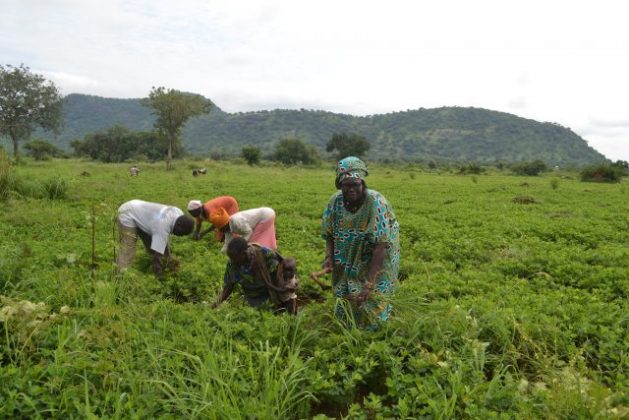Women Are the Future of Africas COVID-19 Recovery

NAIROBI, Mar 06 (IPS) - The COVID-19 pandemic is arguably one of the biggest disruptors to modern day life as we know it. The economic and social disruption caused by the pandemic is devastating; millions of people have lost their lives, tens of millions of people are at risk of falling into extreme poverty and nearly half of the global work force is at risk of losing their livelihoods. Africa is facing its first economic recession in 25 years due to the impact of the pandemic.
In a continent where agriculture accounts for 23% of the GDP and about 40% of the workforce is engaged in the sector, agriculture has not been spared from the worst impacts of the pandemic.
Border closures, trade restrictions and confinement measures have been preventing farmers from accessing inputs such as seeds and fertilizers, markets and agricultural workers from harvesting crops, thus disrupting domestic and international food supply chains and reducing access to healthy, safe and diverse diets.
Through all this, about 50% of the global population has been disproportionately affected by the pandemic, women.
The pandemic has exacerbated existing structural economic, social, and technological inequalities that women face as they struggle to perform their multiple roles in society. These inequalities undermine women’s capacity to respond and recover from the disruptions that result from the pandemic. Women are a key pillar in the Africa’s food and agricultural systems.
They constitute 50% of the agricultural workforce and own one-third of the small and medium enterprises (SME’s) that produce, process and trade in agricultural products and services. The pandemic not only affected their livelihoods and agri-business enterprises, but also increased women’s workloads, threatened their families’ wellbeing, and increase incidences of gender-based violence.
As we commemorate the International Women’s Day this year, we are acutely aware that as the narrative now shifts to building back better, we must ensure that women are at the center of short term and longer term recovery efforts to create a more equal and resilient society.
Over the course of my career as an agricultural economist and development practitioner and, I have seen the change that can be realized when women receive the support, they need during times such as these. A growing body of evidence demonstrates the power of interventions designed for and targeted to women in agriculture that can help protect their lives and livelihoods in the context of the COVID-19 pandemic.
African governments need to design and support such interventions. This means providing avenues for continued access to inputs such as seeds, fertilizers, pesticides, mechanization and advisory services. It also means women accessing knowledge and skills to make best outcome of their labour inputs.
As economies open after months of lockdowns and restricted movement, access to financing, grants for those that closed due to pandemic and flexible loans for those that kept going albeit in a small way- is key for recovery. Accessing high value markets is an important factor, not only for recovery, but for higher incomes that help build financial resilience in women’s agri-enterprises.
During the pandemic, digital services have provided a crucial lifeline for businesses. Women business managers have used social media to market their products while accessing information on production, weather and agronomic advisories, financing and accessing markets. Deploying digital capacity building at scale and increasing women entrepreneurs’ participation in the digital economy through digital finance, digital marketing and digital trade is key as we rebuild economies.
Initiatives such as VALUE4HER, a platform whose aim is to increase incomes and employment opportunities for women by linking women-led agribusinesses with competitive high value regional and global markets, and improving women business leader’s technical and managerial skills, with training on market dynamics are key to growing women-owned agribusinesses further.
Currently hosting over 750 users from 36 countries across the continent, the platform provides real-time access to relevant knowledge, market information, buyers, financiers, business development services, technical assistance, capabilities and social networks.
These services hosted under one roof provide a conducive ecosystem for female owned agribusinesses to access the tools they need to become profitable businesses.
Also key is providing tailored training and capacity building for women to respond, recover, and build resilience. With low literacy levels and limited networks, women’s access to relevant information and support mechanisms is curtailed.
Programs such as the African Resilience Investment Series for Women Executives (ARISE), which AGRA kicks off today in celebration of international women’s day- seeks to equip women-owned and women-led SMEs with the necessary tools and practical management skills, needed to recover from the impact of COVID-19 pandemic.
Across the globe, it has been inspiring to see prior investments in empowering women-led agribusiness begin to pay off—and that the measures have enabled women farmers to contribute to the fight against COVID-19. This could be the case for Africa too. Investing in women makes good business sense; it leads to increased incomes for women and boosts the wellbeing of their families, which means better lives for families, communities and society as a whole.
Sabdiyo Dido is the Head of Gender and Inclusiveness at the Alliance for a Green Revolution in Africa (AGRA)
© Inter Press Service (2021) — All Rights Reserved. Original source: Inter Press Service

